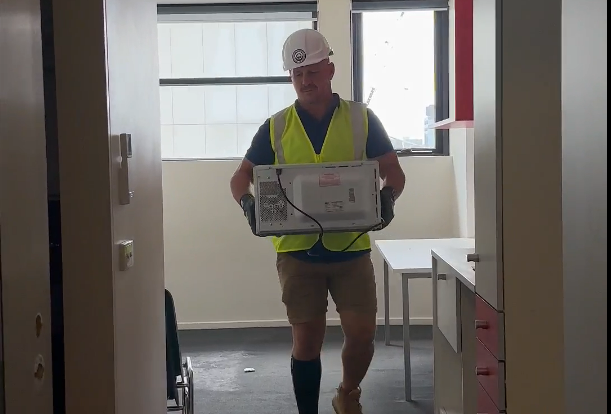The Australian Institute for Infectious Disease’s (AIID) commitment to sustainability and diversity in the construction industry has been on show in the initial stages of the project’s early and enabling works.
Kane Constructions has engaged Indigenous owned and run company Project Net Zero to strip furniture and fittings from the existing buildings on the AIID site.
This forms a key part of Kane’s commitment to divert at least 90% of early and enabling works materials from landfill and to direct at least 2% of their total contract value to groups that are under-represented in the construction industry.
Project Net Zero’s role involves removing, cataloguing, and storing salvaged items before donating them to community organisations. This initiative not only prevents tons of materials from entering landfill, but also addresses an unmet need in the not for profit sector.
Aron Kurzydlo, Director of Project Net Zero, emphasised the co-benefits of their partnership with AIID.
“Through this collaboration, we anticipate rescuing over 1,000 items from the AIID site, including 400 items from the former student accommodation,” he stated.
“These items, ranging from tables and beds to cooktops and air conditioning units, are in excellent condition and can serve for many more years. By re-purposing these items, we not only reduce landfill waste but also mitigate the carbon emissions associated with manufacturing new goods.”
He further highlighted the social impact of their work, noting, “As a fully Indigenous-owned enterprise, we prioritise employing and contracting Indigenous people. Additionally, the majority of salvaged items will be directed back to Aboriginal or Torres Strait Islander organisations in the local vicinity of the project area. This collaboration exemplifies a win-win scenario for both the community and the environment.”
To construct the cutting-edge Australian Institute for Infectious Disease in the Melbourne Biomedical Precinct, several buildings need to be stripped and demolished to clear the building site.
We're doing this as #sustainably as possible by working with Project Net Zero to… pic.twitter.com/pLxuQ3NzP5
— University of Melbourne (@UniMelb) May 6, 2024
